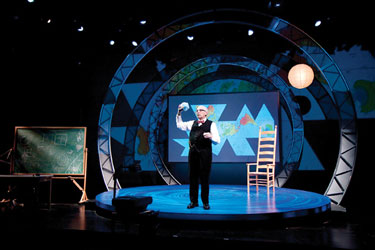Slumber Dome
Arena's History feels less like you're on a journey and more like you're attending a lecture for a required class
So maybe you know about the dome.

R. Buckminster Fuller: The History (and Mystery) of the Universe
Or, maybe you don’t know about the dome. Maybe, when looking at advertisements and posters for Arena Stage’s production of the one-man show R. Buckminster Fuller: The History (and Mystery) of the Universe, you’ve been completely baffled. Who is this guy that bears more than a slightly passing resemblance to writer/economist/comedian/game show host Ben Stein?
That guy is writer/architect/designer/inventor/futurist/environmentalist/sustainability advocate/renaissance man R. Buckminster Fuller (Rick Foucheux) who did not design but perfected and revolutionized the structure known as the geodesic dome.
If you’ve been to Montreal you’ve undoubtedly seen the Montreal Biosphère – a structure designed by Fuller for Expo ’67 that now serves as a museum space. (It is virtually impossible to go to Montreal without someone directing you to go see the huge steel skeleton — it’s like trying to go to Knoxville and not seeing the Sunsphere.)
If you’ve not been to Montreal then just think of Epcot Center’s iconic Spaceship Earth, a building Fuller did not design but which draws on his concepts and is, not coincidentally, named after a phrase Fuller coined. But the one-man play History (and Mystery) is not an architecture lesson. Nor is it, in any substantial way, a show about Fuller’s life. Sure, the narrative thread of what led this modern master from precocious preschooler crafting complex geometric structures from peas and toothpicks to designing one of the great modern architectural sites is part of the show, but this extended monologue is more intended to raise questions. Provoke new thinking. Entertain a little. Explore a little. Even frighten a little.
Unfortunately, History (and Mystery) also often engages just a little.
Written and directed by San Diego Repertory Theatre co-founder D.W. Jacobs, History (and Mystery) is a dense, often frustrating collection of thoughts, concepts and ideas drawn directly from the work of one of the foremost thinkers of the 20th century. But the multi-media concoction – though virtuosic in its seamless blending of old technology (a phonograph player, an overhead projector), arguably aging technology (film, hand-drawn animation), and new (live-feed video projection) – tends toward the cold.
There is a quirky robustness to it, as though someone has given the smartest kid in school the opportunity to stage their own assembly. And it does have moments of great humor.
Most resonant are those times when it is clear that we have, as a global society, failed to heed the lessons laid out for us in the past. While many would like to believe that the theory of conscious environmentalism and the necessity of considering the impacts of population growth and planet-wide adoption of the Western consumer culture are wholly contemporary, they are not. Fuller was urging recognition of the finite resources onboard our ”Spaceship Earth” decades before the mantra of “reduce, reuse, recycle” became chic. He believed that the future of the society, hurtling through space on this big, blue marble, depended on our increasingly focusing our ability to do more with less. He recognized that our continued health depended not on overcoming the realities of the natural world, but fully comprehending them.
Jacobs’s Fuller is presented as a smart but not entirely present everyman. A poet philosopher whose brilliance is casually worn. A man who, like the original article, believed everything could be understood by anyone.
The problem is, that’s not always the case.
And, by not stopping every now and again, by not seeding the path with enough humanity so that we are able to see and embrace this man who moves us to intermission by abruptly announcing, ”I have to use the bathroom,” before dashing off-stage, we are left to try and develop a relationship with an individual who is as much a symbol as that dome that is his greatest accomplishment.
The hasty intermission is just one of the hazy lines Jacobs employs. History (and Mystery) opens and closes so casually that play and reality melt into one another. In this element, Jacobs is quite successful as is the one man in this one-man, Foucheux.



To July 4
Arena Stage
1800 S. Bell St.
Arlington, Va.
$27-$70
202-488-3300
arenastage.org
Foucheux is completely submerged in the character of Fuller. There are no signs of actor or exposition, simply a single-minded professor-type, shuffling through transparencies and hurriedly scribbling notes on an increasingly overcrowded chalkboard. One almost begins to feel a sort of empathy for the Fuller Foucheux is portraying, a weak admiration for the absent ramblings of an obsessive in his glory.
But there is simply not enough there to grasp or embrace. Neither likeable nor definably unlikeable, History (and Mystery)‘s Fuller slowly dissolves into a walking, talking prop. There is information. There is theory. But there is not necessarily story. You begin to feel less like you’re on a journey and more like you’re attending a lecture. For a required class. That is only offered during the summer term.
And at the end of that lecture, also known as R. Buckminster Fuller: The History (and Mystery) of the Universe, you will, absolutely, understand all you need to know about the dome. What you might not know, however, is all that much more about the man behind it or what you are to do with all this newfound information. Class dismissed.
Support Metro Weekly’s Journalism
These are challenging times for news organizations. And yet it’s crucial we stay active and provide vital resources and information to both our local readers and the world. So won’t you please take a moment and consider supporting Metro Weekly with a membership? For as little as $5 a month, you can help ensure Metro Weekly magazine and MetroWeekly.com remain free, viable resources as we provide the best, most diverse, culturally-resonant LGBTQ coverage in both the D.C. region and around the world. Memberships come with exclusive perks and discounts, your own personal digital delivery of each week’s magazine (and an archive), access to our Member's Lounge when it launches this fall, and exclusive members-only items like Metro Weekly Membership Mugs and Tote Bags! Check out all our membership levels here and please join us today!






















